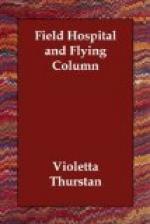The shells were crashing over our heads and bursting everywhere, but we were too busy to heed them, as more and more men were brought to the dressing-station. It was an awful problem what to do with them: the house was small and we were using the two biggest rooms downstairs as operating- and dressing-rooms. Straw was procured and laid on the floors of all the little rooms upstairs, and after each man’s wounds were dressed he was carried with difficulty up the narrow winding staircase and laid on the floor.
The day wore on and as it got dark we began to do the work under great difficulties, for there were no shutters or blinds to the upstairs windows, and we dared not have any light—even a candle—there, as it would have brought down the German fire on us at once. So those poor men had to lie up there in the pitch dark, and one of us went round from time to time with a little electric torch. Downstairs we managed to darken the windows, but the dressings and operations had all to be done by candle-light.
The Germans were constantly sending up rockets of blue fire which illuminated the whole place, and we were afraid every moment they would find us out. Some of the shells had set houses near by on fire too, and the sky was lighted up with a dull red glow. The carts bringing the men showed no lights, and they were lifted out in the dark when they arrived and laid in rows in the lobby till we had time to see to them. By nine o’clock that evening we had more than 300 men, and were thankful to see an ambulance train coming up the line to take them away. The sanitars had a difficult job getting these poor men downstairs and carrying them to the train, which was quite dark too. But the men were thankful themselves to get away, I think—it was nerve-racking work for them, lying wounded in that little house with the shells bursting continually over it.
All night long the men were being brought in from the trenches. About four in the morning there was a little lull and some one made tea. I wonder what people in England would have thought if they had seen us at that meal. We had it in the stuffy dressing-room where we had been working without a stop for sixteen hours with tightly closed windows, and every smell that can be imagined pervading it, the floor covered with mud, blood and debris of dressings wherever there were not stretchers on which were men who had just been operated on. The meal of milkless tea, black bread, and cheese, was spread on a sterilized




